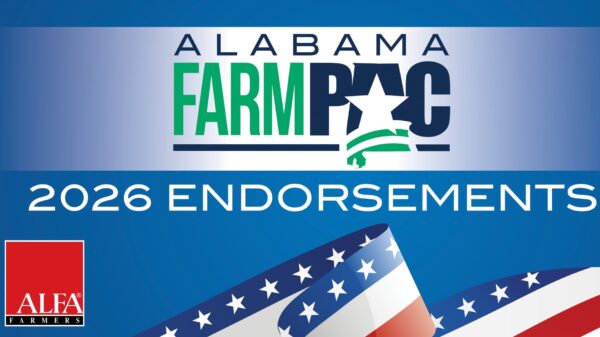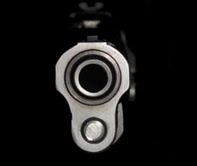By Brandon Moseley
Alabama Political Reporter
On Tuesday, May 19, the Senate Governmental Affairs Committee will consider HB47 which clarifies a number of questions in Alabama’s gun laws. Second Amendment groups in Alabama are deeply divided over the compromise legislation.
The Bill is sponsored by State Representative Christopher John England (D-Tuscaloosa). Sen. Arthur Orr (R) is expected to carry the bill in the Senate. The Deputy Director of Legislative Affairs for Alabama Gun Rights Shanna Chamblee announced, “Senator Orr is happy to work with Alabama Gun Rights Inc. Thank you Senator Orr for your willingness to carry good gun rights legislation (HB47 Substitute bill). It was a pleasure speaking with you today.”
AGR wrote in a statement, “HB47 represents another advance by AGR in maintaining and securing gun rights for all Alabamians. In a time of pointed partisanship, AGR’s Legislative Team was able to bring all parties to the table, utilizing our relationships with key members of the Legislature and other interested organizations, to negotiate a Bill agreeable and beneficial to all. Thanks to all of you for your continued support of AGRN, and we are already working with our partners on our 2015 Conference to identify, draft, and propose legislation for the 2016 Legislative Session!”
BamaCarry is opposed to the legislation as it passed in the Alabama House of Representatives.
According to BamaCarry, “From a Gun Rights perspective, this bill does give a few minor concessions:
1. It adds Duress as a defense for Menacing and Reckless Endangerment.
2. It restores the legality of someone taking their under-18 child to the range to learn to shoot.
3. Restores the ability to store your weapon in your vehicle on the premises of hospitals that provide mental health care.”
The compromise given for these small gains in the restoration of our rights is heavy:
1. It does reduce the distance someone with a weapon must maintain from a demonstration, per §13A-11-59, from 1,000 feet to 300 feet, however, it makes it unlawful from any distance for you to have a firearm which is visible to anyone at the demonstration. In effect, you can now be charged, at any distance, so long as a spectator or participant claims they felt threatened by the mere presence of you exercising your fundamental right to bear arms. This sets a dangerous precedent to a law, which is probably unconstitutional on its face, by now claiming it to be more narrowly tailored. You will be guilty of a Class C misdemeanor.
2. Instead of clarifying confusion such as the definition of the “other barriers” specified in §13A-11-61.2(b), this Bill leaves the confusion in place and adds a penalty of Class C misdemeanor for a violation of §13A-11-61.2(b). Currently, there is much confusion over exactly what constitutes a §13A-11-61.2(b) facility. There are Publicly Owned Properties around the state that now have “No Firearms” signs placed on them that should be protected by the State Preemption Law, §13A-11-61.3(a). Complaints to the AG as to the reasons these places were found compliant have gone unanswered in disregard of §13A-11- 61.3(f)(3). This confusion is heightened by the existence of signs provided by various sheriffs throughout the state which declare the signed private properties which are open to the public are §13A-11-61.2(b) compliant, when they appear,to reasonable interpreters, to be non-compliant. Currently, per §13A-11-52, a person may carry his pistol on private property not his own if he has a permit.
3. It changes §13A-11-72 to specify that anyone subject to a valid protection order for domestic abuse, or anyone of unsound mind cannot own a firearm. This change is to make the statute line up with federal law 18 U.S.C. § 922(g)(1-9). However, under current Alabama statute §13A-11-72 persons who have been convicted of a crime of violence are prohibited from owning a pistol. This has been applied to allow such persons to own long guns for hunting purposes. This will become illegal under Alabama law under this Bill.
4. Section 3 of this Bill, which is new code, specifies that no person may carry a loaded firearm under certain conditions involving alcohol and/or controlled substances. On its face, this would appear to be a good statute. However, this section contains a measure of blood alcohol level as a condition, followed by a completely subjective condition regarding alcohol and/or controlled substances:
(1) There is 0.08 percent or more by weight of alcohol in his or her blood.
(2) He or she is under the influence of alcohol to such a degree as to render him or her incapable of safely operating a firearm. It contains a version of (2) for alcohol and/or controlled substances. The problem is there is no specified way for determination of (2). This leaves this completely subjective judgement up to the discretion of the Law Enforcement Officer on the scene. Additionally, the use of the term “controlled substances” instead of “illegal drugs” or “illegal narcotics” would technically include the use of certain antihistamines. While we do not condone consumption of alcohol or illegal drugs while carrying a firearm, there are already laws on the books that deal with the abuse of these things.”
AGR admits the bill is a compromise, “Even when HB47 has passed and become law, there will still be things that can be improved upon. We live in an imperfect world but that does not mean we do not strive for bettering our lives each time we have the chance. SB 286 was not perfect, but it did a lot of good; HB47 is not perfect but it does a lot of good. long before next legislative session, we have in fact already started working on more legislation to make things even better.”
The National Rifleman’s Association (NRA) Spokesperson Catherine Mortensen said, “The NRA supports the original provisions of the bill , which eliminate both Alabama’s unduly restrictive minor possession of pistols law and the state’s handgun registration scheme. These two provisions are critical to protecting Alabaman’s Second Amendment freedoms not only today, but for future generations, as well.”




















































